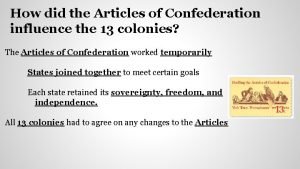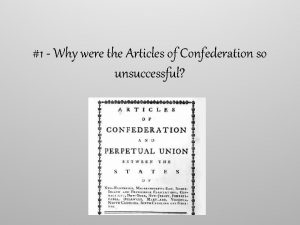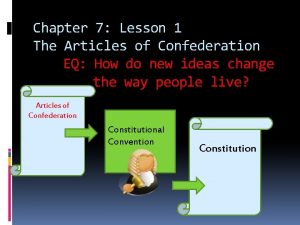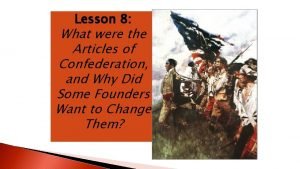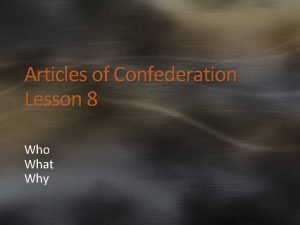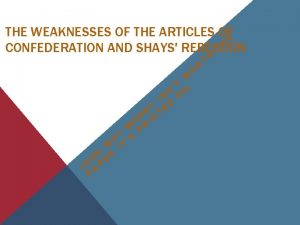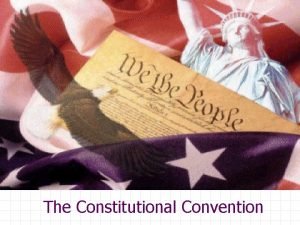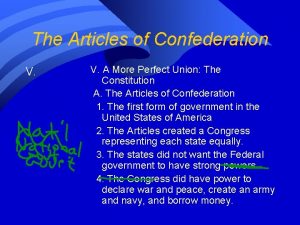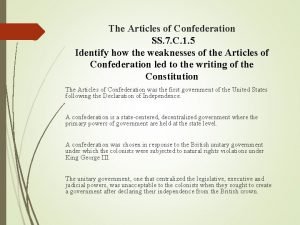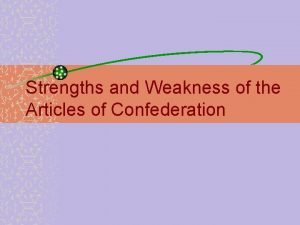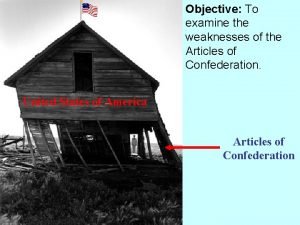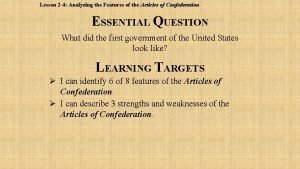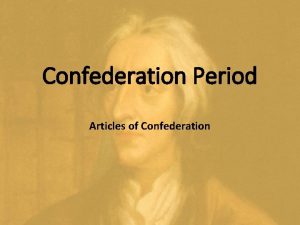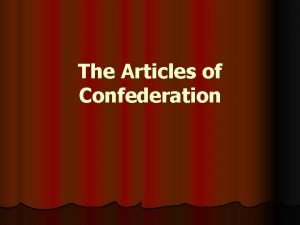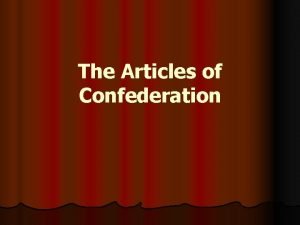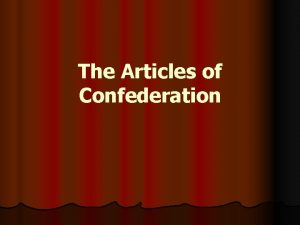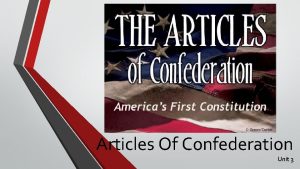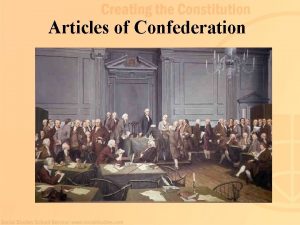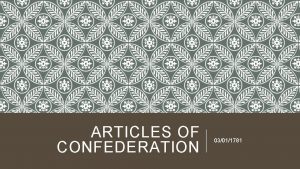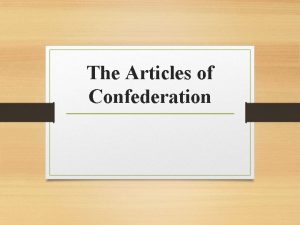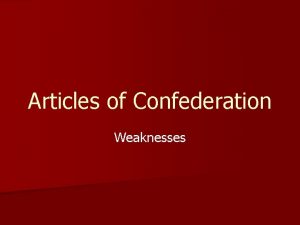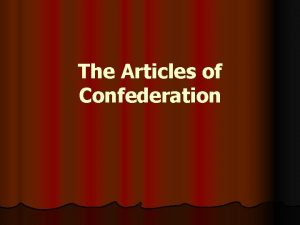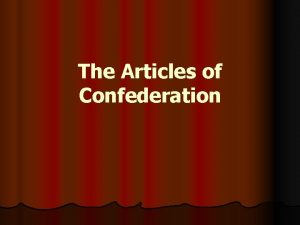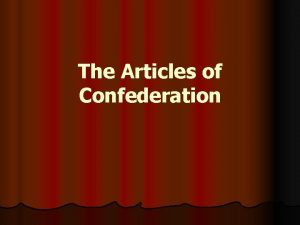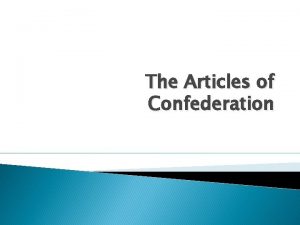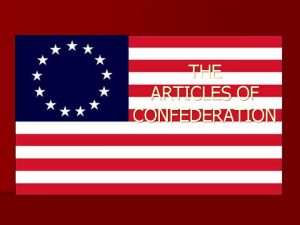Articles of Confederation Lesson 8 Who What Why















- Slides: 15

Articles of Confederation Lesson 8 Who What Why

Lesson Objectives Describe the US’s first national constitution, The Articles of Confederation Explain why some people thought the government under the Articles was not strong enough. Take and defend positions on the strengths and weaknesses of the Articles of Confederation, the significance of the Northwest Ordinance and Americans’ mistrust of a strong national government.

Why and How were the Articles of Confederation created? Americans were considering the responsibilities of states under their constitutions. They were also considering economic and political relationships between the states and the rest of the world The constructed the articles to set forth a union among the states. Confederation: a form of political organizations in which sovereign states delegate power to the national government.

Problems addressed by the Articles of Confederation • Fear of a strong central government • Each state was like a separate nation • Winning the war was paramount to their understanding of power. • League of Friendship Left most of the power to the states: • Strictly defined the authority of the central legislature or congress. • Only state governments had control over their citizens. • Congress could not collect taxes from the states or people directly. • Congress could not regulate trade among the states.

Franklin designs a confederation • Proposed a colonial government in 1754 • States imagined other colonial governments • Franklin submitted a draft of the articles to the Second Continental Congress in July 1775 • Independence became more important than government

Fear that some states would dominate others in the central gov. • Representation and voting in Congress • Apportionment of war expenses among states • Territorial claims in the West: • Some states had fixed western boundaries, while others did not Solutions Emerge: • Article V gave each state one votes regardless of population. Majority of 9 required. • Article VIII created a formula for requesting funds that was not based upon population, free or enslaved. • Articles were ratified on March 1. 1781.

Sections of the Articles • Article II - Each state retains it’s own sovereignty • Article V - Each state shall have one vote in Congress, but may be represented by more than that size in Congress. • Article VIII – Costs of war will be paid out of the general treasury. Money for the treasury shall be supplied by the states based upon the value of all land within each state. Taxes shall be laid by the legislatures of states. • Article IX – The United States in Congress shall be the last resort for appeal on disputes between states. • Article XIII – Amending the Articles must be voted on and agreed to in Congress and then be confirmed by legislatures of every state

Achievements of the Government under the Articles • Revolutionary War – Secured Independence • Did not create separate executive and judiciary branches. • Committee to hear finance, foreign relations and military affairs. • Judiciary (admiralty) to hear appeals from state courts. • Laid ground work for cabinet. • Northwest Alliance of 1787 – • Prohibited slavery in the lands of the Northwest Territory: north of Ohio River, Mississippi, Indiana, Illinois, Wisconsin and part of Minnesota. • Process for statehood • Required new states to set aside money for education by setting aside land that could be sold to fund schools. • Complete control over Northwest Territory

Weaknesses of the Articles… • Fear of tyranny led them to create a government with very limited power: • Congress had no power to tax • Congress could only REQUEST that states pay certain amounts • Borrowed most of the money it needed to pay for the Revolutionary War • No way to pay that debt • Requested 10 million to pay debts; States paid 1. 5 million • Congress could make agreements with other nations • Could not force the states to abide by these agreements • Some citizens imported goods from other nations and then refused to pay for them. • Some countries became reluctant to deal with these other nations. • Great Britain recognize Congress’ failure to control foreign trade, it closed the West Indies to trade.

Weaknesses of the Articles… • Congress could not regulate trade among the states • Often taxed products moving through their state • Congress could not regulate behavior of citizens • Only states could regulate behavior • If a citizen was disobey federal laws, there was nothing Congress could do about that.

Attempts to solve the problems • Proposal to alter taxation formula • No amendment every won approval from all the states • 1783 – most original members had left Congress. New members preferred a limited government • Federalists such as Hamilton and Madison began to look elsewhere for support for solutions. • Prominent leaders suggested a meeting with representatives from all of the states. • 1780 Massachusetts had held a constitutional convention • 1784 – Washington and Madison call a meeting at Annapolis • Discuss Potomac route to the west • Delegates agree to an extended agenda for another meeting in 1786

Would it work at the national level? • 1786 Madison and Washington decided that it could be used at the national level also • 1786 – Annapolis, Maryland • Only 5 states send representatives to the meeting to discuss commerce • Frustrated by the low turnout, Hamilton, Madison and others wrote a report asking Congress to call a meeting in Philadelphia to discuss changing the articles. • Representatives were authorized to propose new amendments NOT to develop a new constitution.

Shay's Rebellion supports change Many realized the Articles were weak Took a dramatic event to galvanize support Daniel Shay led a group of hundreds of farmers from western Massachusetts • Captain in the Revolutionary War • Called themselves the Regulators – wanted to regulate the power of the state government • Many soldiers could not pay their debts because Congress could not pay them their wages. • They lost their farms and their homes • Some were sent to prison

Discontent rises Crowds gathered to prevent the courts from selling the property None of the actions were new • Colonists had called themselves Regulators • Attempted to block British officials • Crowd action was a longstanding response to perceived injustice Tried to capture the state arsenal in Springfield, Massachusetts • Governor called in the militia to put down the rebellion • Frightened property owners that feared it might occur in their state • Convinced a number of Americans that the national government must be strengthened.

Washington to Madison “What stronger evidence can be given of the want of energy in our governments than these disorders? If there exists not a power to check them, what security has a man of life, liberty or property? . . Thirteen Sovereignties pulling against each other, and all tugging at the federal head, will soon bring ruin on the whole. ”
 Articles of confederation fail
Articles of confederation fail Why were the articles of confederation unsuccessful
Why were the articles of confederation unsuccessful Articles of confederation activity
Articles of confederation activity Achievements of the articles of confederation
Achievements of the articles of confederation Lesson 8 the articles of confederation
Lesson 8 the articles of confederation Political weaknesses of the articles of confederation
Political weaknesses of the articles of confederation Achievements of the articles of confederation
Achievements of the articles of confederation Problems with articles of confederation
Problems with articles of confederation Articles of confederation strengths
Articles of confederation strengths Weaknesses of articles of confederation
Weaknesses of articles of confederation Strengths of the articles of confederation
Strengths of the articles of confederation Weaknesses of articles of confederation
Weaknesses of articles of confederation 3 weaknesses of the articles of confederation
3 weaknesses of the articles of confederation Articles of confederation weaknesses
Articles of confederation weaknesses Articles of confederation fail
Articles of confederation fail Strengths of the articles of confederation
Strengths of the articles of confederation
